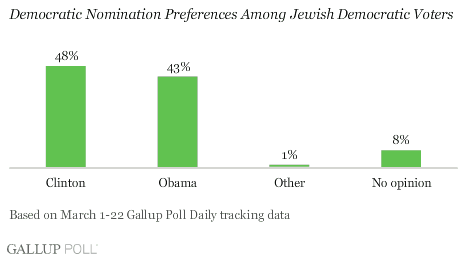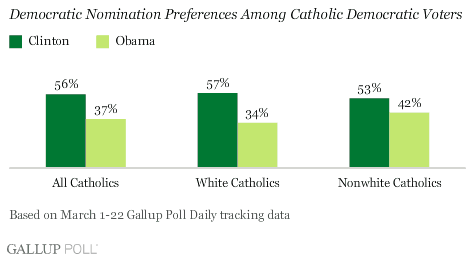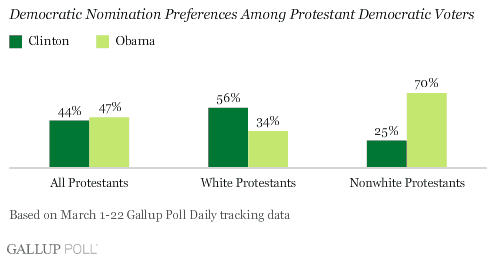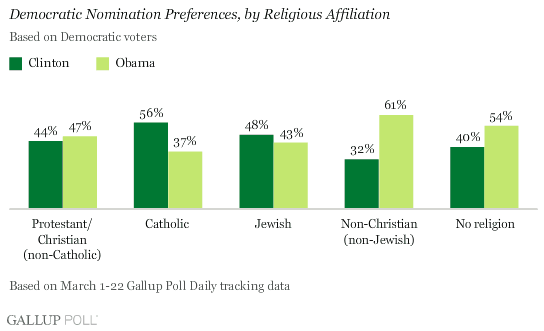PRINCETON, NJ -- Jewish Democratic voters show a slight preference for Hillary Clinton (48%) over Barack Obama (43%) for the party's 2008 presidential nomination. The five-point Clinton advantage is within the margin of error for this sample of Jewish Democrats.

The data are based on interviews with 348 Jewish Democratic voters conducted in Gallup Poll Daily tracking in March. So far this month, all Democratic voters regardless of religious affiliation are equally divided (46% each) in their nomination preferences between Clinton and Obama.
Obama's ability to win votes in the U.S. Jewish community has been questioned, given suggestions that he does not support Israel as strongly as other candidates. Some of Obama's supporters (including the Rev. Jeremiah Wright, former pastor of Obama's church) and foreign policy advisers are regarded as anti-Israel. Obama has met with Jewish leaders to reassure them of his commitment to Israel.
While the candidates run about evenly among Jewish Democrats, Clinton does better among Catholic Democratic voters, leading Obama by nearly 20 percentage points, 56% to 37%, in the March data among this group. Clinton outpolls Obama among both white Catholics (57% to 34%) and nonwhite Catholics (53% to 42%). The latter group largely comprises Hispanics, a core Clinton support group.

Democratic voters who are Protestant (including those who say they are "Christian" but provide no specific denomination) divide about equally between Obama (47%) and Clinton (44%). But the overall Protestant numbers hide a deep racial gap, with Clinton leading by more than 20 points among white Protestant Democratic voters (56% to 34%) and Obama holding an even larger 45-point lead among nonwhite Protestant Democratic voters (70% to 25%).

With Jewish and Protestant Democrats basically split in their preferences, and Catholics strongly in Clinton's corner, Obama is able to make up the difference by running better than she does among Democrats with no religious preference (54% to 40%) and among those who practice non-Christian religions (61% to 32%).

Survey Methods
Results are based on telephone interviews with 9,204 Democratic voters, aged 18 and older, in Gallup Daily tracking polling conducted March 1-22, 2008. For results based on the total sample of national adults, one can say with 95% confidence that the maximum margin of sampling error is ±2 percentage points.
For results based on the sample of 368 Jewish Democratic voters, the maximum margin of sampling error is ±6 percentage points.
For results based on the sample of 2,375 Catholic Democratic voters, the maximum margin of sampling error is ±2 percentage points.
For results based on the sample of 4,449 Protestant and "Christian" Democratic voters, the maximum margin of sampling error is ±2 percentage points.
For results based on the sample of 468 non-Christian/non-Jewish Democratic voters, the maximum margin of sampling error is ±5 percentage points.
For results based on the sample of 1,340 Democratic voters with no religious affiliation, the maximum margin of sampling error is ±3 percentage points.
Interviews are conducted with respondents on land-line telephones (for respondents with a land-line telephone) and cellular phones (for respondents who are cell-phone only).
In addition to sampling error, question wording and practical difficulties in conducting surveys can introduce error or bias into the findings of public opinion polls.
